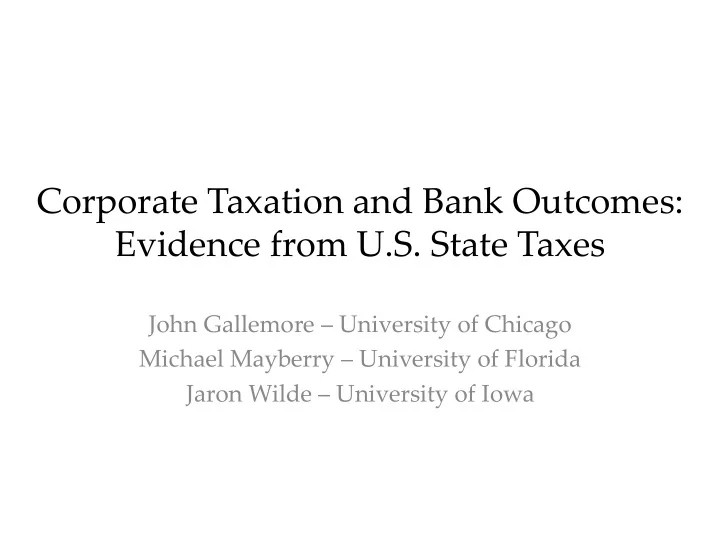

Corporate Taxation and Bank Outcomes: Evidence from U.S. State Taxes John Gallemore – University of Chicago Michael Mayberry – University of Florida Jaron Wilde – University of Iowa
Motivation • Banks are important – Key provider of capital and liquidity to businesses and individuals – Highly connected to the rest of the economy • Taxes are important • We know little about the effect of taxes on banks – Hanlon and Heitzman (2010) Gallemore, Mayberry, Wilde Corporate Taxation and Bank Outcomes 2
Our study • Our objective – Provide some empirical evidence on the effect of taxation on banks • Focus on a particular type of taxation – Corporate income taxation • Take a holistic approach by examining multiple bank outcomes – Lending, leverage, liquidity, risk-taking Gallemore, Mayberry, Wilde Corporate Taxation and Bank Outcomes 3
Research design • Setting – U.S. state corporate income taxation • Heider and Ljungqvist 2015; Ljungqvist, Zhang, Zuo 2017 – Single-state U.S. commercial banks • This setting comes with advantages and disadvantages • Basic design: Changes in bank outcomes = f (changes in tax rates) • Identification challenge: Tax rate changes are not random – Bank fixed effects for time-invariant differences across banks (& states) – State-level macroeconomic controls (for drivers of tax rate changes) – Account for contemporaneous changes in state-level banking supervision / regulation – Others: Bank-level time-varying controls, year-quarter fixed effects Gallemore, Mayberry, Wilde Corporate Taxation and Bank Outcomes 4
Outcome #1: Lending • Why we should care – Bank lending is a critical source of capital for businesses and individuals • Why taxes might or might not matter – Income taxation reduces after-tax operating cash flows, which in turn reduces the funds available for lending – Alternatively, lenders could change lending in response to a tax rate change to maintain certain levels of profitability • Measures – Traditional measure (captures term loans / drawn down portion of credit lines) – Measure that additionally captures undrawn portion of credit lines • Findings – No effect on average – Different effect depending on state of macroeconomy: income taxation is negatively (positively) associated with lending when macroeconomic conditions are poor (good) – Weak evidence that relation is positive for more profitable banks Gallemore, Mayberry, Wilde Corporate Taxation and Bank Outcomes 5
Outcome #2: Leverage • Why we should care – Some suggest that bank leverage is associated with susceptibility to financial crises • Why taxes might or might not matter – Prior research has shown positive leverage-tax association in non-bank setting – However, unlike non-banks, leverage is fundamental to bank business models – Furthermore, bank leverage is regulated (e.g., capital requirements) • Measures: Overall leverage, deposit vs. non-deposit funding, insured vs. uninsured deposits • Findings – No effect on average – Better capitalized banks are more likely to exhibit a positive association – Differential effects based on state of macroeconomy (positive in good times, weaker in poor times) – Most of the action comes from non-deposit funding (possible reason: higher cost) Gallemore, Mayberry, Wilde Corporate Taxation and Bank Outcomes 6
Outcome #3: Liquidity • Why we should care – Bank illiquidity played big role in 2007-09 financial crisis – Subsequent reforms have specifically targeted liquidity risk • Why taxes might or might not matter – Banks manage liquidity risk through a combination of liquid asset holdings and operating cash flows – Income taxation diverts cash flows from the bank to the taxing authority, which may lead the bank to hold more liquid assets • Measure – Holdings of cash and other liquid assets (e.g., government bonds) • Findings – No effect on average – Positive (negative) effect during poor (good) macroeconomic conditions Gallemore, Mayberry, Wilde Corporate Taxation and Bank Outcomes 7
Outcome #4: Risk-taking • Why we should care – Bank risk-taking played a critical role in the recent financial crisis • Why taxes might or might not matter – Prior research shows taxation shapes risk-taking in non-financial institutions – However, bank risk-taking is heavily regulated / supervised • Measures – Regulatory risk-weighted assets • Findings – No effect on average – Positive (negative) effect during good (poor) macroeconomic conditions – Some differences in effect based on bank size and profitability Gallemore, Mayberry, Wilde Corporate Taxation and Bank Outcomes 8
Additional tests and issues • Charter-level tests: Federal vs. state – Federally chartered banks are not subject to state banking regulation – Similar results in subsample of federally chartered banks • Timing tests – No anticipatory effect with lending or liquidity – Some anticipatory effect with leverage and risk-taking • Other tests – Removal of states without a tax rate change – Different minimum size thresholds Gallemore, Mayberry, Wilde Corporate Taxation and Bank Outcomes 9
Summary • We find that income taxation has nuanced effects on banks – Negative effects (lower lending, greater liquid assets) during crisis periods – Positively associated with non-deposit leverage during normal periods • Contributions – Potential policy implications – Extends prior research on income taxation effects to financial institutions • We see our paper as a starting point for additional research on the effect of taxation on banks – Other financial institutions – Other taxes – Interaction with other forces (e.g., regulation) Gallemore, Mayberry, Wilde Corporate Taxation and Bank Outcomes 10
Thank you!
Recommend
More recommend